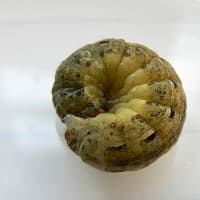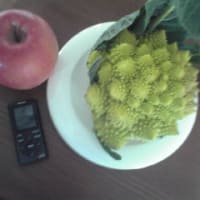Reader's Digestの連載料理記事
What's Cooking? の12月号のレシピは "Turducken" でした。
"Turducken"は:
This is a turkey stuffed with a duck, stuffed with a chicken stuffed with dressing.
七面鳥の丸焼きの様な写真が載っていて、材料を見ると:
1.5kg whole chicken, boned
1kg duck, boned
8kg turkey, boned
とあります。 "boned" は骨付きの様な印象を受けますが、 "stuffed" 料理で、しかも説明に: The birds need to be boned for this so you may need to find a good butcher.
と書かれています。 骨付きなら "good butcher" は不要なので "boned" は印象とは逆の骨抜きの意味の様です。 何故 "boned" が骨なしになるのか不思議な気がします。 辞書で確認します。
・WordNet: 1. having bones as specified ("His lanky long-boned body") 2. having had the bones removed ("A boned (or deboned) fish")
・Dictionary.com:
1. having a particular kind of bone or bony structure (used in combination): beautifully boned; raw-boned; small-boned.
2. having the bones taken out; cooked or served with the bones removed: boned chicken; boned veal.
"boned" には骨有りと骨なしの意味があって、料理に関係すると "boned" が骨なしになるのですね。 "boneless" や "deboned" と言う言葉があるのに "boned" が何故使われるようになったのかは分かりませんでした。
果物の種無しに、種を意味する"pit / pitted" (Ref. http://blog.alc.co.jp/blog/3302827/archive/2008/07/26 & http://blog.alc.co.jp/blog/3302827/archive/2009/12/23 )が使われるのと同じですね。 例: "a pitted olive" (種無しオリーブ)
What's Cooking? の12月号のレシピは "Turducken" でした。
"Turducken"は:
This is a turkey stuffed with a duck, stuffed with a chicken stuffed with dressing.
七面鳥の丸焼きの様な写真が載っていて、材料を見ると:
1.5kg whole chicken, boned
1kg duck, boned
8kg turkey, boned
とあります。 "boned" は骨付きの様な印象を受けますが、 "stuffed" 料理で、しかも説明に: The birds need to be boned for this so you may need to find a good butcher.
と書かれています。 骨付きなら "good butcher" は不要なので "boned" は印象とは逆の骨抜きの意味の様です。 何故 "boned" が骨なしになるのか不思議な気がします。 辞書で確認します。
・WordNet: 1. having bones as specified ("His lanky long-boned body") 2. having had the bones removed ("A boned (or deboned) fish")
・Dictionary.com:
1. having a particular kind of bone or bony structure (used in combination): beautifully boned; raw-boned; small-boned.
2. having the bones taken out; cooked or served with the bones removed: boned chicken; boned veal.
"boned" には骨有りと骨なしの意味があって、料理に関係すると "boned" が骨なしになるのですね。 "boneless" や "deboned" と言う言葉があるのに "boned" が何故使われるようになったのかは分かりませんでした。
果物の種無しに、種を意味する"pit / pitted" (Ref. http://blog.alc.co.jp/blog/3302827/archive/2008/07/26 & http://blog.alc.co.jp/blog/3302827/archive/2009/12/23 )が使われるのと同じですね。 例: "a pitted olive" (種無しオリーブ)



























※コメント投稿者のブログIDはブログ作成者のみに通知されます